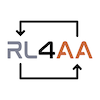Speaker
Description
Achieving precise bunch spacing in the Large Hadron Collider (LHC) relies on advanced RF manipulations in the Proton Synchrotron (PS). Multiple RF systems covering a large range of revolution harmonics (7 to 21, 42, 84) allow performing bunch splitting manipulations. To minimize bunch-by-bunch variations in intensity, longitudinal emittance, and shape, precise tuning of relative RF amplitude and phase settings is essential. Since 2023, a machine-learning-based system has been deployed in the PS to automate the optimization of one such manipulation, the longitudinal triple splitting, utilizing deep Reinforcement Learning (RL) and Convolutional Neural Networks (CNN). As part of an effort to fully automate PS operations for LHC-beams, new longitudinal monitoring systems have enabled the transition from on-demand optimization to an autonomous, continuously monitoring system. Pre-trained RL models, with weights hosted centrally on the Machine Learning Platform (MLP), seamlessly interact with accelerator observation and control systems through the Unified Controls Acquisition and Processing (UCAP) framework. This work demonstrates a practical implementation for how to deploy ML-based models for autonomous control of complex accelerator processes, which is likely to play an essential part of future operational efficiency and stability in high-energy physics facilities.

